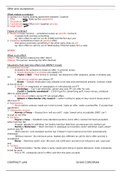Offer and acceptance
What makes a contract
A contract is a legally binding agreement between 2 parties
1. Offer Make up the agreement
2. Acceptance
3. Consideration Often both together or none
4. Legal intent
Types of contract
1. Bilateral (most common – sometimes known as specific contract)
2 people both promise something
eg. Dom offers to sell his car for £1000 and Rachel says yes
2. Unilateral (sometimes known as general offer)
One person promises something if the other party does an act
eg. Dom offers to sell his car on Wednesday if Rachel bakes him a cake
OFFER
What is an offer?
Offeror: The person making the offer (Dom)
Offeree: The person receiving the offer (Rachel)
Situations that look like offers but AREN’T (insat)
1. Invitations to treat
Invitations for someone to make an offer, 4 common areas…
1. Goods displayed in a window are always ITT
1. Fisher v Bell ~ Flick knives in window, not allowed to offer weapons, goods in window was
ITT
2. Self-service displays are always ITT
1. Boots ~ Certain medication only allowed to be sold with pharmacist present, contract made
at the till so ok
3. Adverts in magazines or newspapers or noticeboards are ITT
1. Partridge ~ Can’t sell wild birds, advert was only ITT not offer for sale
1. Carlill v Carbolic smokeball ~ £100 if got flu, advertising puff, move money, unilateral
offer to whole world
4. Wording in letters can be ITT not actual offers
1. Gibson v Manchester city council ~ Letter inviting to apply to buy council house wasn’t
offer but ITT
2. Negotiations
Go on before contract made can invite to treat, make an offer, make counteroffer, if accept then
agreement
3. Statements of price
Harvey v Facey ~ Buying farm ‘will you sell?’, reply ‘lowest price acceptable £900’ can’t
accept as not offer
4. Auctions
Payne v Cave ~ Establish rules standard auctions, bid is offer, contract formed (accepted)
when hammer fall
If owner decides to withdraw ‘lot’ before hammer falls then can because not contract yet
Harris v Nickerson ~ Want furniture in catalogue so travelled, owner withdrew, sued, advert
auction was ITT
‘With reserve’: Like standard auction but if doesn’t reach reserve price then automatically
withdrawn
‘Without reserve’: No minimum price, highest bid, different as call for bid is offer and bid is
acceptance
Barry ~ Machines worth over 14k each, bid £200 each and won but refused to sell, sued and
won
5. Tenders
Standard tenders: Tender when a party needs work doing or goods delivered, invite companies
to bid for work
This is ITT, companies send in offers and then the party accepts
CONTRACT LAW OLIVIA CORCORAN





